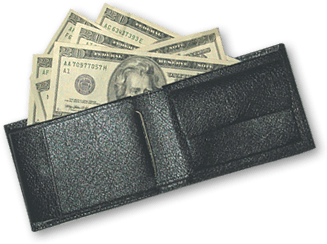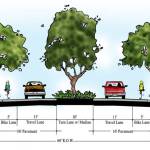
If I had a dollar for every time I either hear or read that “people on bikes need to pay for streets” I could put in bike lanes all over Spokane, it seems at times.
I see it on Facebook. I hear it from people. I read it in the media from people who should know better. December 29, 2011, for example, the Spokesman-Review opined that, while complete street designs are worthwhile, “the extra costs—if there are extra costs—will fall exclusively on motorists”.
- In an article on future street construction bonds.
- Which are paid for by property taxes.
- Which are paid by all property owners.
- And thus do not in any way, shape, or form “fall exclusively on motorists.”
Oh, and by the way? I ride a bike and I’m an occasional motorist and I take transit, so go figure out how that works with your new math.
As Peter Duffy pointed out in a great follow-up letter to the editor, the editorial perpetuated myths about the public funding of streets. We need to debunk those myths.
Since I pay for the street bond via my property taxes, not fuel taxes, I pay each and every day for the streets on which I ride my bike and (rarely) drive my car.
Street maintenance is also not “exclusively” funded by motorists. According to the City of Spokane Street Department, “Local street maintenance is funded from the City’s General Fund, the City’s portion of the State gas tax, Real Estate Excise Tax (REET) and a portion of the State’s Arterial Street Fund that supports the maintenance of City streets.”
Thus every time I pay sales tax for any purchase—including my bike-related shopping—I am paying for streets without driving a car.
When we bought our house we paid the REET—so we paid for streets without driving a car.
The state’s arterial street fund comes from fuel tax and from whatever else the legislature might want to put into it. Not that they’re coming up with lots of extra dollars these days but if they did that would have to come from the state portion of the sales tax, which I most often pay without driving a car.
The City of Spokane instituted a new $20 car tab fee and created a Transportation Benefit District. I pay that $20 per year whether or not my car ever leaves my driveway. This particular source got enacted with the directive that 10% of the funds be utilized for pedestrian projects.
And some years I pay for streets and highways in part through my federal income tax. For several years the general fund has been tapped to supplement the federal fuel tax for transportation projects to the tune of $8 billion in 2008, $7 billion in 2009, and $14.7 billion in 2010. And of course many of the stimulus projects undertaken in an effort to address our sagging economy were transportation-related–and all were funded from the general fund, not the Highway Trust Fund.
Overall, “fuel taxes and other direct and indirect user fees currently account for less than 60 percent of total system revenue (federal, state, and local), so that users do not bear anywhere near the full costs of their travel” (from Paying Our Way, the report of the National Surface Transportation Infrastructure Financing Commission).
Thus federal transportation dollars come from all of us, not exclusively from motorists, which is why it makes sense that federal transportation dollars get directed not exclusively to highways but also to mass transit and bike/pedestrian projects. Motorists aren’t paying their own way–a little pot/kettle/black problem there, don’t you think?
Other than the federal fuel tax under the current federal transportation policy, the city’s TBD is the only transportation-specific tax or fee I pay that has a proviso addressing more than one mode in our network. And that bike/pedestrian element in federal policy is under attack right now. If some of the House Republicans have their way there will be no federal funding for my #1 transportation mode even though I’m paying for it.
So the next time you hear that people who bike should pay for streets you can say, “We do.” When you hear that the streets should belong to those who pay for them, you can say, “They do. And that means all of us.”
Related Reading
- Spokane’s Street Bond Program
- Spokane’s Transportation Benefit District
- Horizon 2040: The Metropolitan Transportation Plan for the Spokane area now under development by the Spokane Regional Transportation Council
- Untangling Transportation Funding: A 2009 opinion piece on the Brookings site that has some interesting facts about how each type of motorized vehicle pays less than the actual cost of providing its infrastructure
- New Study Shows Federal Investment in Bike Infrastructure Paying Off
- National Surface Transportation Infrastructure Financing Commission
- Paying Our Way: A New Framework for Transportation Finance. This is the 2009 report from the NSTIFC (PDF).
- National Surface Transportation Policy and Revenue Study Commission
- Status of the Highway Trust Fund, 1957-2010
- Don’t Settle for Incomplete Streets!
- Take Action! Congress Could Cut Bike/Pedestrian Funding
- Greener, More Connected Cities Could Experience Other Benefits
- Now Coveted: A Walkable, Convenient Place
- Walk this Way: The Economic Promise of Walkable Places in Metropolitan Washington, DC
P.S.: Additional Food for Thought
This very brief discussion of revenue sources for street construction and maintenance doesn’t begin to touch the true social costs of single-occupancy vehicle traffic–little things such as reduced productivity due to congestion and the stress of driving, increased air pollution, increased healthcare costs, and lack of funding availability for other societal obligations such as education, among others. Not only are drivers not paying the actual full direct cost of providing streets–they’re not beginning to touch the additional costs.
Check out this report from CEOs for Cities: “Greener, More Connected Cities Could Experience Other Benefits.” This is put out by a bunch of business leaders saying we need to invest more in active transportation for the economic return and the effect on those externalities I just mentioned.
Your Turn
- Have you ever heard that you don’t pay for streets because you bike?
- How do you respond?
- Will you share this on Facebook, Twitter, and other places to help break down the wall of misunderstanding?










Here’s more food for thought: We pay more for cell phone service than we do for roads. http://www.theatlanticcities.com/politics/2012/12/will-we-finally-see-increase-state-and-federal-gas-taxes/4099/
Elly Blue blogged on this a while back and noted just the other day on Twitter that, sadly, it’s still relevant–she was just reblogged: http://www.theskanner.com/article/Busting-the-Myth-of-the-Freeloading-Bicyclist-2012-07-02
Thank u for the information. We need communities that grow sustainably, that would help traffic. i hope everyone picks up on my startup http:ourtownzip.com which i founded to promote local commerce.